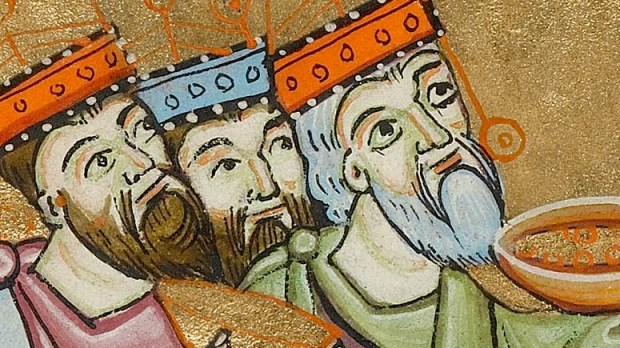And behold, the star that they had seen at its rising preceded them, until it came and stopped over the place where the child was.They were overjoyed at seeing the star, and on entering the housethey saw the child with Mary his mother.They prostrated themselves and did him homage.Then they opened their treasures and offered him gifts of gold, frankincense, and myrrh. —Matthew 2:9b-11
When St. Luke wrote his account of the birth of Jesus, he spoke of shepherds tending their flocks by night. Inspired by an angelic messenger and the multitude of the heavenly host with their songs of God’s glory, these shepherds “went in haste and found Mary and Joseph, and the infant lying in the manger” (Luke 2:16). We hear this story in the gospels proclaimed in the Masses of Christmas “During the Night” and “at Dawn.”
St. Matthew’s account of the birth of Jesus has a very different tone. Concerned as he is with demonstrating how Jesus was the fulfillment of the promises made to the People of Israel in past generations, Matthew draws on Old Testament images that would have been quite familiar to his Jewish-Christian audience. And so, he omits Luke’s pastoral account of the shepherds’ visit and tells a very different story of sages from the East who travel great distances—from far beyond the borders of Palestine—to worship this newborn “king of the Jews.”
Unlike St. Luke’s shepherds, who would have most likely been Jews, Matthew’s magi represented the nations—the Gentiles—and one of the primary messages of the Solemnity of the Epiphany is that this newborn King is not only the “king of the Jews,” as the magi called him, but that he is truly a king for all people.
We hear this beautifully proclaimed in the First Reading, taken from Prophet Isaiah:
Nations shall walk by your light,
and kings by your shining radiance …
for the riches of the sea shall be emptied out before you,
the wealth of nations shall be brought to you.
Caravans of camels shall fill you,
dromedaries from Midian and Ephah;
all from Sheba shall come
bearing gold and frankincense,
and proclaiming the praises of the Lord.
Beyond this important truth—that Jesus is the Savior of all nations and peoples—is the meaning of the gifts brought by the Magi. In the First Reading of the Mass (quoted above), we find reference to the gold and frankincense that the magi presented the Child. These have traditionally been understood as references to the Christ’s royal status (the gold) and his divinity (the frankincense—which would be offered to a deity in religious rituals).
In the reference to myrrh, however, Matthew used other sources. In the ancient world, myrrh was used as an elixir or medicine, as a drug, and, more specifically, as a perfume used in burial rites in various cultures. In the Old Testament, it is most notably used by Moses as an ingredient in the oil used by sacred anointings, as well as by Queen Esther in a ritual of purification. Scholars tend to agree, however, that the gift of myrrh, as presented by the magi in Matthew’s Gospel, not only has these references to purity and religious ritual, but it also serves to help us understand that this Child, who is both a King and Divine, is also mortal and that human death will be an indispensable part of his story. We even sing about this in John Henry Hopkins’ classic carol “We Three Kings”:
Myrrh is mine; its bitter perfume
Breathes a life of gathering gloom;
Sorrowing, sighing,
Bleeding, dying,
Sealed in the stone-cold tomb.
As we reflect on the gifts of the magi—including the gift of the myrrh—we are reminded that the celebration of the Epiphany is a celebration of who this Child really is as we reflect on the various moments of revelation that are included in the feast (cf. the Magnificat Antiphon for Evening Prayer II).
The myrrh at the manger is a reminder to us that the mystery of the Incarnation is inseparably tied to the fullness of the Paschal Mystery. Yes, this child is both God-and-human, but the reality of his suffering and death are also part of the Christmas story, just as they are part of our own stories. This is the source of our hope and consolation as we continue to confront dark realities in our lives and in the world, even during this season of light.
We know that the cold of the tomb, symbolized by the myrrh, is not the end of the story. Even these Christmas days are illuminated by the light of Easter glory.
The invitation for us on this Epiphany is to reflect on the full meaning of the Christmas Mystery and on who it is who has been born for us and to offer a prayer of thanks for the gift of this newborn King.
Who or what are the “stars” who have helped guide you to Christ during the course of your life? Which of the gifts of the magi—the gold, frankincense, and myrrh—speaks to your heart this Epiphany?What gift can you offer the Holy Child as we continue to celebrate the Christmas season?
Words of Wisdom: “We offer the Lord gold when we shine in his sight with the light of heavenly wisdom. We offer him frankincense when we send up pure prayer before him, and myrrh when, mortifying our flesh with its vices and passions by self-control, we carry the cross behind Jesus.”—St. Bruno of Segni, Sermon 1 on the Epiphany

